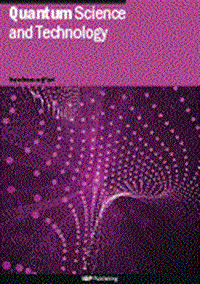Measurement schemes for quantum linear equation solvers
IF 5
2区 物理与天体物理
Q1 PHYSICS, MULTIDISCIPLINARY
引用次数: 0
Abstract
Solving computational fluid dynamics (CFD) problems requires the inversion of a linear system of equations, which can be done using a quantum algorithm for matrix inversion (Gilyén et al 2019 Proc. 51st Annual ACM SIGACT Symp. on Theory of Computing 193–204). However, the number of shots required to measure the output of the system can be prohibitive and remove any advantage obtained by quantum computing. In this work we propose a scheme for measuring the output of a quantum singular value transform (QSVT) matrix inversion algorithm specifically for the CFD use case. We use a quantum signal processing based amplitude estimation algorithm (Rall and Fuller 2023 Quantum7 937) and show how it can be combined with the QSVT matrix inversion algorithm. We perform a detailed resource estimation of the amount of computational resources required for a single iteration of amplitude estimation, and compare the costs of amplitude estimation with the cost of not doing amplitude estimation and measuring the whole wavefunction. We also propose a measurement scheme to reduce the number of amplitudes measured in the CFD example by focussing on large amplitudes only. We simulate the whole CFD loop, finding that thus measuring only a small number of the total amplitudes in the output vector still results in an acceptable level of overall error.量子线性方程解算器的测量方案
求解计算流体动力学(CFD)问题需要对线性方程组进行反演,这可以使用矩阵反演的量子算法来完成(gily等人2019 Proc. 51 Annual ACM SIGACT Symp)。论计算理论(193-204)。然而,测量系统输出所需的射击次数可能令人望而却步,并且消除了量子计算获得的任何优势。在这项工作中,我们提出了一种方案来测量量子奇异值变换(QSVT)矩阵反演算法的输出,特别是针对CFD用例。我们使用基于量子信号处理的幅度估计算法(Rall and Fuller 2023 quantum 7 937),并展示了如何将其与QSVT矩阵反演算法相结合。我们对振幅估计的单次迭代所需的计算资源量进行了详细的资源估计,并将振幅估计的成本与不进行振幅估计和测量整个波函数的成本进行了比较。我们还提出了一种测量方案,通过只关注大振幅来减少CFD示例中测量的振幅数量。我们模拟了整个CFD回路,发现仅测量输出矢量中总振幅的一小部分仍然会导致可接受的总体误差水平。
本文章由计算机程序翻译,如有差异,请以英文原文为准。
求助全文
约1分钟内获得全文
求助全文
来源期刊

Quantum Science and Technology
Materials Science-Materials Science (miscellaneous)
CiteScore
11.20
自引率
3.00%
发文量
133
期刊介绍:
Driven by advances in technology and experimental capability, the last decade has seen the emergence of quantum technology: a new praxis for controlling the quantum world. It is now possible to engineer complex, multi-component systems that merge the once distinct fields of quantum optics and condensed matter physics.
Quantum Science and Technology is a new multidisciplinary, electronic-only journal, devoted to publishing research of the highest quality and impact covering theoretical and experimental advances in the fundamental science and application of all quantum-enabled technologies.
 求助内容:
求助内容: 应助结果提醒方式:
应助结果提醒方式:


